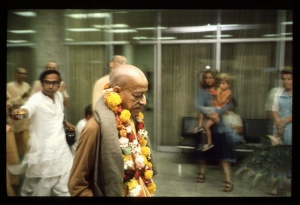SB 10.11.53: Difference between revisions
m (1 revision(s)) |
(Vanibot #0054 edit - transform synonyms into clickable links, which search similar occurrences) |
||
| (One intermediate revision by one other user not shown) | |||
| Line 1: | Line 1: | ||
{{info | {{info | ||
|speaker= | |speaker=Śukadeva Gosvāmī | ||
|listener=King | |listener=King Parīkṣit | ||
}} | }} | ||
[[Category:Srimad-Bhagavatam - Canto 10 Chapter 11]] | |||
[[Category:Bhagavatam Verses Spoken by Sukadeva Gosvami - Vanisource|101153]] | |||
<div style="float:left">'''[[Srimad-Bhagavatam]] - [[SB 10|Tenth Canto]] - [[SB 10.11: The Childhood Pastimes of Krsna|Chapter 11: The Childhood Pastimes of Kṛṣṇa]]'''</div> | |||
<div style="float:right">[[File:Go-previous.png|link=SB 10.11.52]] '''[[SB 10.11.52]] - [[SB 10.11.54]]''' [[File:Go-next.png|link=SB 10.11.54]]</div> | |||
{{RandomImage}} | |||
==== TEXT 53 ==== | ==== TEXT 53 ==== | ||
<div | <div class="verse"> | ||
muktaṁ bakāsyād upalabhya bālakā | :muktaṁ bakāsyād upalabhya bālakā | ||
rāmādayaḥ prāṇam ivendriyo gaṇaḥ | :rāmādayaḥ prāṇam ivendriyo gaṇaḥ | ||
sthānāgataṁ taṁ parirabhya nirvṛtāḥ | :sthānāgataṁ taṁ parirabhya nirvṛtāḥ | ||
praṇīya vatsān vrajam etya taj jaguḥ | :praṇīya vatsān vrajam etya taj jaguḥ | ||
</div> | </div> | ||
| Line 17: | Line 22: | ||
==== SYNONYMS ==== | ==== SYNONYMS ==== | ||
<div | <div class="synonyms"> | ||
''[//vanipedia.org/wiki/Special:VaniSearch?s=muktam&tab=syno_o&ds=1 muktam]'' — thus released; ''[//vanipedia.org/wiki/Special:VaniSearch?s=baka&tab=syno_o&ds=1 baka]-[//vanipedia.org/wiki/Special:VaniSearch?s=āsyāt&tab=syno_o&ds=1 āsyāt]'' — from the mouth of Bakāsura; ''[//vanipedia.org/wiki/Special:VaniSearch?s=upalabhya&tab=syno_o&ds=1 upalabhya]'' — getting back; ''[//vanipedia.org/wiki/Special:VaniSearch?s=bālakāḥ&tab=syno_o&ds=1 bālakāḥ]'' — all the boys, the playmates; ''[//vanipedia.org/wiki/Special:VaniSearch?s=rāma&tab=syno_o&ds=1 rāma]-[//vanipedia.org/wiki/Special:VaniSearch?s=ādayaḥ&tab=syno_o&ds=1 ādayaḥ]'' — headed by Balarāma; ''[//vanipedia.org/wiki/Special:VaniSearch?s=prāṇam&tab=syno_o&ds=1 prāṇam]'' — life; ''[//vanipedia.org/wiki/Special:VaniSearch?s=iva&tab=syno_o&ds=1 iva]'' — like; ''[//vanipedia.org/wiki/Special:VaniSearch?s=indriyaḥ&tab=syno_o&ds=1 indriyaḥ]'' — senses; ''[//vanipedia.org/wiki/Special:VaniSearch?s=gaṇaḥ&tab=syno_o&ds=1 gaṇaḥ]'' — all of them; ''[//vanipedia.org/wiki/Special:VaniSearch?s=sthāna&tab=syno_o&ds=1 sthāna]-[//vanipedia.org/wiki/Special:VaniSearch?s=āgatam&tab=syno_o&ds=1 āgatam]'' — going to their own place; ''[//vanipedia.org/wiki/Special:VaniSearch?s=tam&tab=syno_o&ds=1 tam]'' — unto Kṛṣṇa; ''[//vanipedia.org/wiki/Special:VaniSearch?s=parirabhya&tab=syno_o&ds=1 parirabhya]'' — embracing; ''[//vanipedia.org/wiki/Special:VaniSearch?s=nirvṛtāḥ&tab=syno_o&ds=1 nirvṛtāḥ]'' — being freed from the danger; ''[//vanipedia.org/wiki/Special:VaniSearch?s=praṇīya&tab=syno_o&ds=1 praṇīya]'' — after collecting; ''[//vanipedia.org/wiki/Special:VaniSearch?s=vatsān&tab=syno_o&ds=1 vatsān]'' — all the calves; ''[//vanipedia.org/wiki/Special:VaniSearch?s=vrajam&tab=syno_o&ds=1 vrajam] [//vanipedia.org/wiki/Special:VaniSearch?s=etya&tab=syno_o&ds=1 etya]'' — returning to Vrajabhūmi; ''[//vanipedia.org/wiki/Special:VaniSearch?s=tat&tab=syno_o&ds=1 tat] [//vanipedia.org/wiki/Special:VaniSearch?s=jaguḥ&tab=syno_o&ds=1 jaguḥ]'' — loudly declared the incident. | |||
</div> | </div> | ||
| Line 24: | Line 29: | ||
==== TRANSLATION ==== | ==== TRANSLATION ==== | ||
<div | <div class="translation"> | ||
Just as the senses are pacified when consciousness and life return, so when Kṛṣṇa was freed from this danger, all the boys, including Balarāma, thought that their life had been restored. They embraced Kṛṣṇa in good consciousness, and then they collected their own calves and returned to Vrajabhūmi, where they declared the incident loudly. | Just as the senses are pacified when consciousness and life return, so when Kṛṣṇa was freed from this danger, all the boys, including Balarāma, thought that their life had been restored. They embraced Kṛṣṇa in good consciousness, and then they collected their own calves and returned to Vrajabhūmi, where they declared the incident loudly. | ||
</div> | </div> | ||
| Line 31: | Line 36: | ||
==== PURPORT ==== | ==== PURPORT ==== | ||
<div | <div class="purport"> | ||
It was the practice of the inhabitants of Vrajabhūmi to compose poetry about the incidents that occurred in the forest when Kṛṣṇa performed His different activities of killing the asuras. They would compose all the stories in poetry or have this done by professional poets, and then they would sing about these incidents. Thus it is written here that the boys sang very loudly. | It was the practice of the inhabitants of Vrajabhūmi to compose poetry about the incidents that occurred in the forest when Kṛṣṇa performed His different activities of killing the ''asuras''. They would compose all the stories in poetry or have this done by professional poets, and then they would sing about these incidents. Thus it is written here that the boys sang very loudly. | ||
</div> | </div> | ||
__NOTOC__ | |||
<div style="float:right; clear:both;">[[File:Go-previous.png|link=SB 10.11.52]] '''[[SB 10.11.52]] - [[SB 10.11.54]]''' [[File:Go-next.png|link=SB 10.11.54]]</div> | |||
__NOTOC__ | |||
__NOEDITSECTION__ | |||
Latest revision as of 18:21, 17 February 2024

A.C. Bhaktivedanta Swami Prabhupada
TEXT 53
- muktaṁ bakāsyād upalabhya bālakā
- rāmādayaḥ prāṇam ivendriyo gaṇaḥ
- sthānāgataṁ taṁ parirabhya nirvṛtāḥ
- praṇīya vatsān vrajam etya taj jaguḥ
SYNONYMS
muktam — thus released; baka-āsyāt — from the mouth of Bakāsura; upalabhya — getting back; bālakāḥ — all the boys, the playmates; rāma-ādayaḥ — headed by Balarāma; prāṇam — life; iva — like; indriyaḥ — senses; gaṇaḥ — all of them; sthāna-āgatam — going to their own place; tam — unto Kṛṣṇa; parirabhya — embracing; nirvṛtāḥ — being freed from the danger; praṇīya — after collecting; vatsān — all the calves; vrajam etya — returning to Vrajabhūmi; tat jaguḥ — loudly declared the incident.
TRANSLATION
Just as the senses are pacified when consciousness and life return, so when Kṛṣṇa was freed from this danger, all the boys, including Balarāma, thought that their life had been restored. They embraced Kṛṣṇa in good consciousness, and then they collected their own calves and returned to Vrajabhūmi, where they declared the incident loudly.
PURPORT
It was the practice of the inhabitants of Vrajabhūmi to compose poetry about the incidents that occurred in the forest when Kṛṣṇa performed His different activities of killing the asuras. They would compose all the stories in poetry or have this done by professional poets, and then they would sing about these incidents. Thus it is written here that the boys sang very loudly.